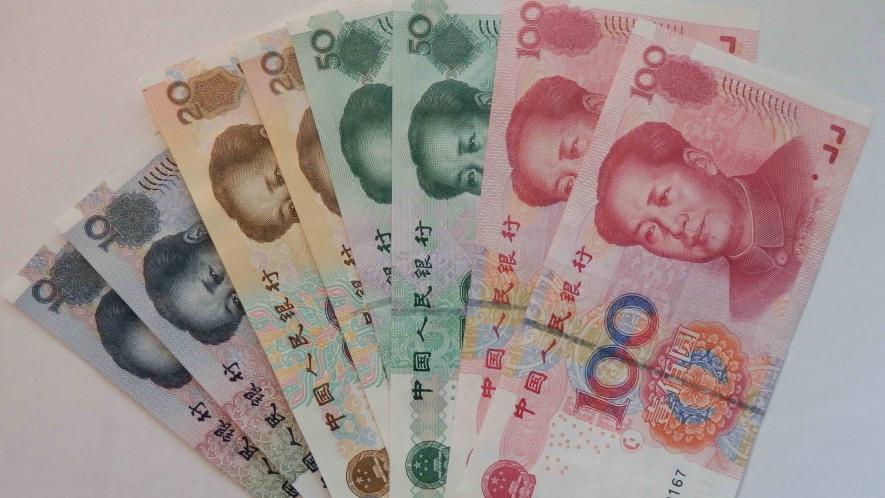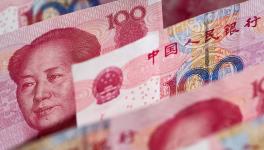With the Rise of China, the Profile of the Renminbi Grows

The announcement by Bundesbank - the German central bank - that the Renminbi would be included in its reserves has come as the latest development that would boost the profile of the Chinese currency.
The news has come ahead of China's much-anticipated launch of the first yuan-denominated oil futures contract later this month in Shanghai (Renminbi is the name of the Chinese currency and yuan is the basic unit of the currency). Observers expect that the new oil futures contract could challenge the US dollar's domination of oil trade in the world. The development has given rise to increased talk of the "petro-yuan" which could potentially take on the "petro-dollar" which has been ruling the roost for decades.
Renminbi makes its way into reserves
Andreas Dombret, a member of Deutsche Bundesbank's executive board, was quoted as saying at the Asian Financial Forum in Hong Kong on Monday, "The RMB is used increasingly as part of central banks' foreign exchange reserves; for example, the European Central Bank included the RMB [as a reserve currency]."
The Chinese currency rose to near a two-year high following the news on Monday, even as the US dollar fell to its lowest in three years.
The European Central Bank (ECB) started buying renminbi assets in 2017, investing 500 million euros worth of the bank's foreign reserves in renminbi during the first half of 2017.
Earlier in October 2016, the Chinese currency had been included in the Special Drawing Rights (SDR), the international reserve asset created by the IMF in 1969 to "supplement its member countries' official reserves". The renminbi became the fifth fully-fledged member of the SDR basket, alongside the US dollar, the euro, the Japanese yen and the British pound.
Before the addition of the renminbi in 2017, the ECB's foreign reserves included US dollars, Japanese yen, gold and SDRs.
In October 2015, China launched the China International Payments System (CIPS), a worldwide interbank payment system which would provide capital settlement and clearing services for cross-border transactions in the Chinese currency. Two years later, the country established a payment system for renminbi and Russian rouble transactions.
The bulk of the world’s oil trade is denominated in US dollars – the dominance of the currency was sealed by a deal struck by the US and Saudi Arabia in the mid-1970s. The dollar dominates international trade, and is the principal reserve currency for the countries of the world.
The developments that point to a greater role for the Chinese currency on the world stage appear to have caused much worry to the apologists of US hegemony – there are already premature obituaries of the yuan-denominated oil futures contract being written, such as one which appeared on The Wall Street Journal.
The US has always taken challenges to the domination of the dollar extremely seriously. It has often been argued that Saddam Hussein’s decision to trade oil for euros, and Muammar Gaddafi’s plan to issue a pan-African gold dinar were major factors which led to the US invasion of Iraq and Libya.
China is a much more powerful rival, obviously, and hence the alarm bells in Washington would ring much louder.
The pound sterling was the key reserve currency for the capitalist world until the collapse of the gold standard. Subsequently, the dollar become the world’s reserve currency with the conclusion of the Bretton Woods Agreement in 1944. The Bretton Woods system decreed dollar to be ‘as good as gold’, with its price being officially fixed at $35 per ounce of gold. The system allowed the US to print dollars at will to cover its current account deficit, and to make capital exports. This became unsustainable as the US printed dollars in enormous quantities to fund the Vietnam War, and there was spiralling inflation. The system collapsed in 1971.
The period following the collapse of the Bretton Woods system saw the US dollar continuing to be the leading reserve currency of the world. Prabhat Patnaik, a leading authority on the international monetary system, terms the system that emerged subsequently as “the oil-dollar standard” – which is based on the stability of the price of dollar in terms of oil, “in the sense at least of the absence of persistent declines” in the price of the dollar in terms of oil.
Countries that rose to the position of the “leading country” – whose currency has been accepted as the key reserve currency for the world – at any given point of time have historically kept their economics open and ran up large and persistent current account deficits.
Britain managed to sustain this by means of the loot of its colonies until that became insufficient as Japan’s emergence as a powerful competitor undermined British dominance of colonial markets like India. The US, on the other hand, printed dollars to finance its current account deficit when the Bretton Woods system was in place. Prabhat Patnaik points out that the current account deficit of the leading country of today (the US) continues to be a problem that makes the post-Bretton Woods system fragile.
The dollar can be expected to continue its domination, which is ultimately buttressed by US military might, for quite some time. But what direction the world economy will take with the rise of China and the renminbi is the big question.
Will the dollar depreciate and then stabilise again, ensuring an extended period of US domination? Or could there be a situation where stable dollar-yuan exchange ratio is maintained? Would China – which is not yet a developed country – allow renminbi to appreciate and be willing to run up current account deficits? Could there be a flight to commodities leading to massive inflation? Or, as Zerohedge suggests, will China, apprehensive of global economic stagnation if dollar falls significantly, not want to go for full-blown hegemony?
A number of such questions remain about developments on this front in the medium to long run. The Chinese planners appear to be treading cautiously so far. The times ahead will certainly be exciting.
Get the latest reports & analysis with people's perspective on Protests, movements & deep analytical videos, discussions of the current affairs in your Telegram app. Subscribe to NewsClick's Telegram channel & get Real-Time updates on stories, as they get published on our website.




















